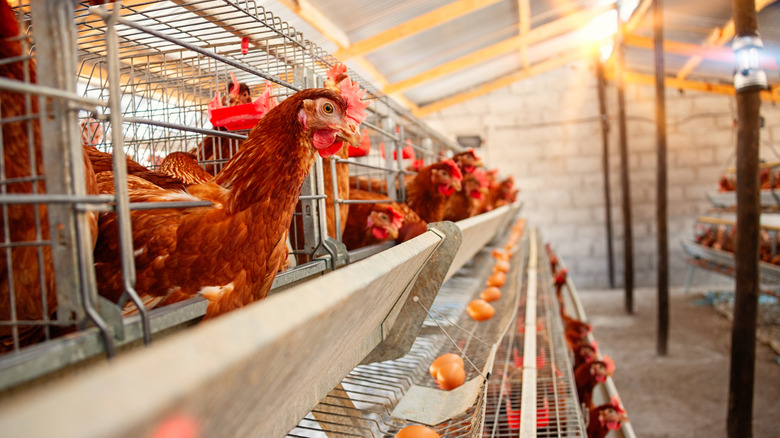Most Of The World's Eggs Come From This Country
Very few foods are all part of breakfast, lunch, dinner, dessert, and snack time like the egg. From scrambled eggs to egg salad sandwiches and deviled eggs to egg custard, eggs commonly make an appearance at every meal of the day. Eaten around the world, it's no surprise that they are an important part of people's diets.
In the United States alone, each person consumed an average of 286.5 eggs in 2020, according to Statista. That's about 35 more eggs per person annually than in 2000 when Americans ate on average 251 eggs. However, those numbers pale in comparison to Americans' egg consumption in 1945 when they ate 404 eggs each, according to the U.S. Department of Agriculture (USDA). Many of those eggs come from Iowa where billions of eggs are annually produced by about 58 million hens. While many other states have significant egg production operations such as Texas and Ohio, even combined, they still do not generate as many eggs as one large country.
The incredible egg
With so many ways to eat an egg (Taste of Home lists 100), it's easy to see why this versatile source of protein, vitamins, and amino acids is a big part of many people's diets. Eggs can be made into everything from scrambled eggs to Twisted Eggs Benedict Salad and Poached Eggs Buddha Bowls to Basil Vegetable Strata, per Taste of Home. But there is sometimes too much of a good thing. The Mayo Clinic says it's best to eat seven eggs or fewer each week because of their cholesterol content. An alternative is to only eat the egg white and to forgo the cholesterol-carrying yolk.
Each egg has about 75 calories, 5 grams of fat, 6 grams of protein, 70 grams of sodium, and 210 milligrams of cholesterol, per the Mayo Clinic. While an egg on its own is fairly healthy, it's often what the egg is served with (think bacon, sausage, or cheese) that helps to make it less healthy by association. So, when consuming an egg, it's important to be cognizant of how it's prepared.
Egg grades and sizes
Generally sold by the dozen, cartons of eggs are labeled by grade and size. In the United States, the three egg grades are AA, A, and B, according to the USDA. Of the three designations, Grade AA egg is the closest to perfection, with thick and firm whites and round yolks. The shells are clean and unbroken. Both Grade AA and Grade A eggs are good for cooking in a variety of methods, with A only having a slightly less firm white.
In comparison, Grade B eggs will have a thinner white and a flatter yolk, according to the USDA. With its overall quality being less than Grades AA and A, Grade B eggs are not usually sold in stores as whole eggs, but instead are generally made into liquid, frozen, and dried egg products.
When it comes to egg size, there are six classifications, per Cooking Light. The way the egg's size is determined is not based on the individual egg's weight, but on the minimum weight per dozen. From largest to smallest, they are: Jumbo (2.5 oz. per egg on average), extra-large (2.25 oz. per egg on average), large (2 oz. per egg on average), medium (1.75 oz. per egg on average), small (1.5 oz. per egg on average), and peewee (1.25 oz. per egg on average).
The largest egg producer
While Iowa may produce the most eggs in the United States, China reigns supreme as the top egg producer in the world. In 2021, 29,315,766 tons of eggs were laid in China, according to the Food and Agriculture Organization of the United Nations (FAO). India produced the second most eggs at 6,710,000 tons followed by the United States with 6,643,722 tons.
World Atlas reports that China is credited with annually generating 24.8 billion kilograms of unprocessed, in-shell hens eggs annually. China has held the title of largest egg producer since 1985, according to Frontiers of Agricultural Science and Engineering. In addition, the country has more than 50% of the world's market share of eggs.
The production of eggs is important for the Chinese for more than economic reasons. Cambridge University Press reports that eggs are an important source of protein for the Chinese diet, with the consumption of eggs forecasted to increase.



